Alleged fraudster ‘Little Nicolás’: “They sent me to a school where everyone was rich except for me”
Francisco Nicolás Gómez Iglesias talks to EL PAÍS about how he went from rubbing shoulders with Spain’s political elite to facing up to 30 years in jail for fraud
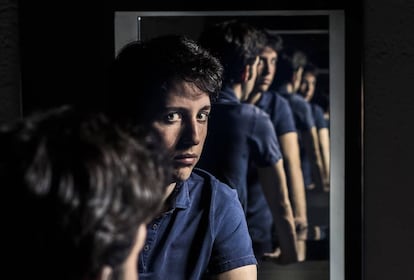
It’s breakfast time. On the second floor of a building in one of the most expensive areas of Madrid, a young man opens the door of a luxury apartment that has been seized by the authorities from a drug dealer, and is now being used by a special team from Spain’s internal affairs unit to investigate Francisco Nicolás Gómez Iglesias, the young opportunist who managed to access the highest echelons of power using a cocktail of personal charm and extravagant lies.
The blinds are down and the plush furniture has been replaced by metal desks and office chairs. There is complete silence, but for the footsteps of the police officers on the wooden floor. The head of the group looks like he could easily be an actor playing the role of a detective. Tall and handsome, he leaves a number of documents bearing the police headquarters masthead on the table. The pages belong to a 2014 police statement given by Francisco Nicolás Gómez Iglesias, who, at that time, was a 20-year-old man still living with his middle-class parents in a modest apartment in Madrid’s northern Chamartín district. Up until then, Gómez Iglesias – or “El Pequeño Nicolás” (or, Little Nicolás) as he would later be dubbed by the Spanish media – had no criminal record.
The 15-page statement is the product of an interrogation that began at 8.35pm on a Thursday five years ago and continued until 5.35am the following morning. Earlier that evening the police had entered the home of Francisco Nicolás, who, at that time, was a charming young man regularly photographed with Spain’s elite who was close to important figures in the conservative Popular Party (PP). Inside, they uncovered evidence of his curious lifestyle: forged reports from the National Center of Intelligence (CNI), police sirens, Civil Guard badges, and various documents bearing the seal of La Moncloa, the seat of government, and the Royal Household.
“There’s something about that search I’ll never forget,” says the police chief. “And that is the incredible composure of that 20 year old. We were searching his grandmother’s house, discovering evidence of the vast lie he had been living, one that could land him in jail, but he watched each one of us with absolute calm as if he was trying to work something out. None of us were in uniform nor were any orders given in his presence. Suddenly, he looked at me half smiling and asked, ‘You’re the boss, right?’”
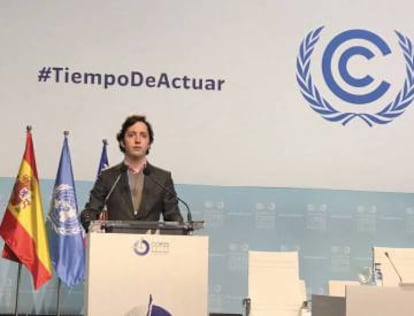
Just hours after the interrogation, the media circus began. Details and photographs began to reveal Little Nicolás’ double life, raising the question – still unanswered – of whether he acted alone or was merely a cog in the wheel of something darker and more complex. His need to be in the news continues unabated – there has been his recent stand-off with the Catalan pro-independence protest group, Committees for the Defense of the Republic (CDR) in Barcelona, his arrest in Madrid for hitting a waiter in a restaurant, and his appearance at the United Nations climate change summit in Madrid, where he said he had “a number of meetings” to attend.
What investigators do know is that Little Nicolás’ quest to be in the limelight began much earlier. Ten years earlier, to be precise. On April 2, 2005, Vatican spokesman Joaquín Navarro Valls had announced the death of John Paul II, 84. The announcement was made at 10pm and the news spread fast with large crowds of mourners gathering in cities around the world. In Madrid’s Colón square, a TV journalist covered the event while a boy hovered in the background, eager to be interviewed. Eventually he got his wish.
“Fran. Ten years old, right?”
“Yes, that’s right,” said the boy, though he was still 15 days from his 10th birthday.
“What did John Paul II mean to you?”
“He seemed like a saint to me,” he replied.
Ten years later, when Fran had become a media sensation and his lawyer María Victoria Vega was trying to get him out of his various legal problems, his mother María del Carmen Iglesias said something to the psychiatrists examining her son that shone a light on how everything could have started: “We sent him to an elite school because we wanted him to make important friends.” And that was exactly what Fran did. He admits so himself.
“I am now 25,” he says in an interview, held before it was revealed that he could be facing 30 years in jail for various fraud cases, including passing himself off as an envoy of Spain’s King Felipe VI, a government representative, and even a secret agent. “I was 20 when I was arrested. But it was from the ages of 15 to 20 when I really had power. You have to take into account that I was sent to a school in El Viso where everyone was rich except for me – I was poor. Everyone lived in massive houses but me. I lived in a small house. So I told myself: ‘I have to have the standard of living I deserve.’”
Five years later, Fran recounts almost word for word everything that he told the psychiatrists in court – that before he was 15, he was the director of a teenage disco; that every weekend he would get 800 to 1,000 young people together, most of whom were the children and grandchildren of important figures; that he started to handle lots of money, which was when the Foundation for Social Studies and Analysis (FAES) signed him up to attract other young people. This catapulted him to center stage.
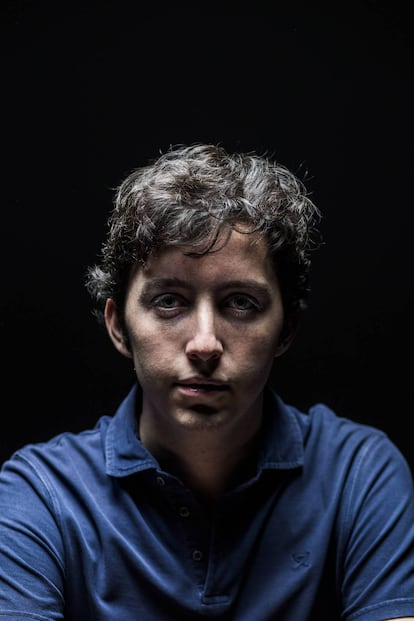
“After that, I met [former prime minister] José María Aznar, [former Madrid mayor] Ana Botella, [Spanish billionaire] Juan Miguel Villar Mir, [banker] Emilio Botín and all the businessmen who had made it and were yet to make it,” he says.
“And what happened then?”
“Well, as it says on the psychiatric reports, which by the way I totally agree with, my choices changed. They said that everything I have lived through could have shaped my cognitive capacity. Because the life I began to live was not at all normal. It wasn’t normal that I went to school in an official car or that I was invited to the coronation of [Spanish King] Felipe VI, or that I was on the balcony on Génova street when [Spanish prime minister] Mariano Rajoy won an absolute majority [at the 2011 election]. None of it was normal at that age, and it ended up shaping my capacity to know right from wrong.”
“Do you mean that at times you acted on the fringes of the law?”
“Yes, yes, there’s a moment when you are so immersed in power that you can’t tell black from white. I totally recognize myself in those reports and I agree with them.”
What the psychiatric reports highlight and what the police officers who interrogated Little Nicolás in 2014 also attest to is that, even after the arrest – even knowing that he could be in trouble with the law – Francisco Nicolás was getting a great deal of pleasure from describing his incredible story in minute detail.
In the 15 pages of his statement, the main players in Spanish politics crop up one after another. Little Nicolás admits that he had acted as a go-between for the Trade Department and the businessman Juan Miguel Villar Mir; that he collaborated with the CNI in the embezzlement case against Iñaki Urdangarin, King Felipe VI’s brother-in-law; and the fiscal fraud case against former Catalan premier Jordi Pujol; not to mention the Catalonia referendum. He also worked for Ana Botella, the former mayor of Madrid when she entered office, and a Chamartín district councilor with whom he often had breakfast so that his chauffeurs and bodyguards could take him to school afterwards in an official vehicle.
You are so immersed in power that you can’t tell black from white
Little Nicolás gave the police dates, names and places. And when it all sounded too surreal to be true, he would introduce some precise detail that would blow them away.
The most striking example of this is when Little Nicolás talked about how he collaborated with Spain’s secret service on some of the country’s most delicate matters. He explained that his contact was none other than Ángeles Maroto, the chief of staff at the CNI. The head of the interrogation looked skeptical. And so Francisco Nicolás went into detail: “Ángeles Maroto’s office is in the inside of the CNI complex after you pass the access control point where you have to leave your cellphone and electronic devices in green lockers. The office is on the first floor. To the right, there is a reception room where the coasters feature the CNI emblem. And on the left, there is an office a little removed from the rest where a secretary called Isabel works.”
The police were shocked. In the days running up to Francisco Nicolás’s arrest, they had often watched as he entered the printing store Workcenter on General Moscardó street, where he would pay for the use of the computers to draw up false reports with the masthead of the CNI or the Ministry of the Presidency. The same reports were later found in his grandmother’s apartment where he lived, having moved there aged 14 because it was less modest than his parents’ home.
The investigators were perplexed. Little Nicolás was a fraud but the extent to which he infiltrated the system was hard to fathom. The court statement from one judge who heard the case in 2014 sums it up: “Let me begin by saying that this judge could not understand how a young person of 20, using just his words [...] could have been able to attend conferences, places and events without alerting anyone.”
Five years later, seated in a café, Francisco Nicolás attempts a response.
“I would define myself as quick; a very young, sharp person who knew everyone – especially, the sons and grandsons of those in power because I went out with them and they liked me. And when politicians see people with a future, it’s in their interest to get close to them. Everything followed from there. At 15 and 16, I sat behind [Spanish businessman] Florentino Pérez and next to the US ambassador in the presidential box for the Copa del Rey soccer final. That was power. Nobody in Spain had managed it at 16. And I told myself, ‘If I can do this now, imagine me at 30 – I will have the world at my feet.’”
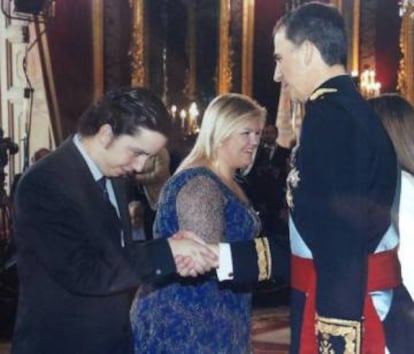
“And it was all your own initiative, or were you working for someone?”
“It was always my initiative. I liked politics, in fact I have now founded a party called Influencia Joven [or Young Influence]. When you are so young, you surround yourself with people who don’t have good thinking. I always say that I am neither clever nor intelligent. What I do have is talent, which might be emotional intelligence or simply getting people to like me, but it is true that my story is different from most. Really there’s no other story like it in the world. [...] It’s unique.”
“And how do you explain that?”
“Even I don’t understand it. Not even I know what happened. I suppose, in the end, there were a number of factions in the CNI and the government was in control of it and they were in conflict with some divisions between the police – the police against the police. The government against the government.”
“Do you think a red line was crossed?”
“Yes. When I am asked for information and I don’t give it.”
“Information about who?”
“About politicians. I am told: ‘Either you give the information or all your privileges will be taken away’ and I said ‘Well, no.’ And that’s when they saw a 20-year-old rebel who was meeting the most important figures in the CNI. And from then on, there were problems.”
According to Little Nicolás, a number of publishing houses have offered him a great deal of money to reveal all but he maintains it was never his plan “to hurt Spain.” For now, the only authorized biography is what lies in the cases against him and the two psychiatric reports. Little Nicolás is facing up to 30 years in prison for charges of forgery, fraud, identity theft, leaking confidential information and belonging to a criminal group.
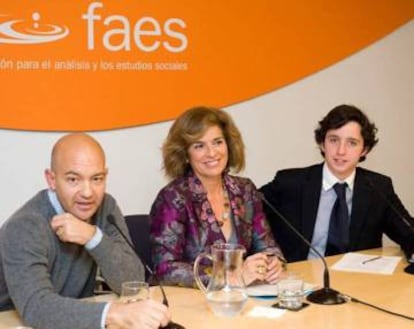
A source close to him says the situation is rather sad. “Fran is being consumed by his own personality,” says the source. “He’s no longer a funny kid of 18; and his ambitious plan to springboard into politics from the PP youth wing [Nuevas Generaciones] has failed. He watched a lot of American series and films, and he made a mistake wanting to become a government spy. He thought he was cleverer than the chief of police and he is paying a high price for it. He no longer knows how to get the attention he needs to continue to feel he’s at the center of the country. One day he sets up a political party, the next he’s in the news for wearing a yellow ribbon [in support of the Catalan separatist leaders in prison for their involvement in the 2017 breakaway attempt] or he’s off to Barcelona so that the independence supporters bombard him with eggs. The last thing was an arrest for assaulting a waiter…”
He could be saved be returning to anonymity, but that would go against his very nature.
English version by Heather Galloway.
